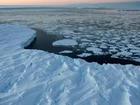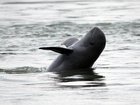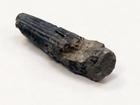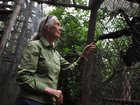The melting of ice in the Antarctic is considered a top threat to global sea level rise, and scientists said Thursday the trend could continue for decades or even centuries to come.
Researchers focused on the Pine Island Glacier in Antarctica, which has been thinning at an increasingly rapid pace for about the past 20 years, as the waters beneath get warmer along with the rest of the ocean.
 Full Story
Full Story
When the air gets really bad, Beijing says it has an emergency plan to yank half the city's cars off the road. The only problem is: It may be difficult to ever set that plan in motion.
A rare alert issued Friday was an "orange" one, the second-highest in the four levels of urgency. It prompted health advisories, bans on barbeques, fireworks and demolition work, but no order to pull cars from the streets.
 Full Story
Full Story
The world's only captive leopard seal, which washed up in Sydney with a shark bite to his abdomen seven years ago, has been put down at an Australian zoo, officials said Thursday.
Casey stopped eating at the start of the year and his health and condition deteriorated to such an extent that he had to be euthanised.
 Full Story
Full Story
A dam which Laos plans to build across the Mekong River could wipe out critically endangered dolphins in downstream Cambodia, the World Wildlife Fund (WWF) warned on Thursday.
If built, the controversial Don Sahong dam in southern Laos would be just a kilometer upstream of the main stretch of water favored by the rare freshwater Irrawaddy dolphin, WWF said in a statement.
 Full Story
Full Story
When stars explode, it's a messy business. But the massive blasts are also useful, seeding the universe with such key elements as calcium, iron and titanium.
And with the help of a new high-energy X-ray telescope, NASA said Wednesday astronomers are closer than ever to seeing just what's going on.
 Full Story
Full Story
A Malaysian university unveiled on Wednesday what researchers called the first dinosaur fossil ever found in the country -- the tooth of a fish-eating predator estimated to be at least 75 million years old.
A team of Malaysian and Japanese palaeontologists found the darkened tooth fossil after a nearly two-year dig in the central state of Pahang, and scientists said further discoveries could come.
 Full Story
Full Story
A Malaysian state declared a water crisis Wednesday over a dry spell that has parched much of the normally rain-bathed country and caused mounting worries over dwindling reservoirs.
Deputy water minister Mahdzir Khalid warned Tuesday that the government was planning to carry out cloud seeding over the capital Kuala Lumpur and its surroundings, where water reserve levels have been critical since last week.
 Full Story
Full Story
Scientists working on a paralysis cure said Tuesday they had demonstrated how a monkey can use only its thoughts, transferred by electrodes, to manipulate a sleeping fellow primate's arm to do its bidding.
The lab experiment, in which a fully sedated Rhesus monkey's hand moved a joystick to perform tasks at the other monkey's command, was designed to simulate full paralysis -- the brain completely disconnected from the muscle it seeks to control.
 Full Story
Full Story
Reports from tens of thousands of bird-counting volunteers show a southern invasion of Arctic-dwelling snowy owls has spread to 25 U.S. states, and frigid cold is causing unusual movements of waterfowl.
Results are still coming in from the four-day annual Great Backyard Bird Count sponsored by the Cornell Lab of Ornithology, the National Audubon Society and Bird Studies Canada. Sponsors say the event, which ended Monday, drew participants from a record 127 countries, surpassing last year's 110. Most were from the U.S. and Canada.
 Full Story
Full Story
China is exploiting Africa's resources just like European colonizers did, with disastrous effects for the environment, acclaimed primatologist Jane Goodall has told AFP.
On the eve of her 80th birthday, the fiery British wildlife crusader is whizzing across the world giving a series of lectures on the threats to our planet.
 Full Story
Full Story



